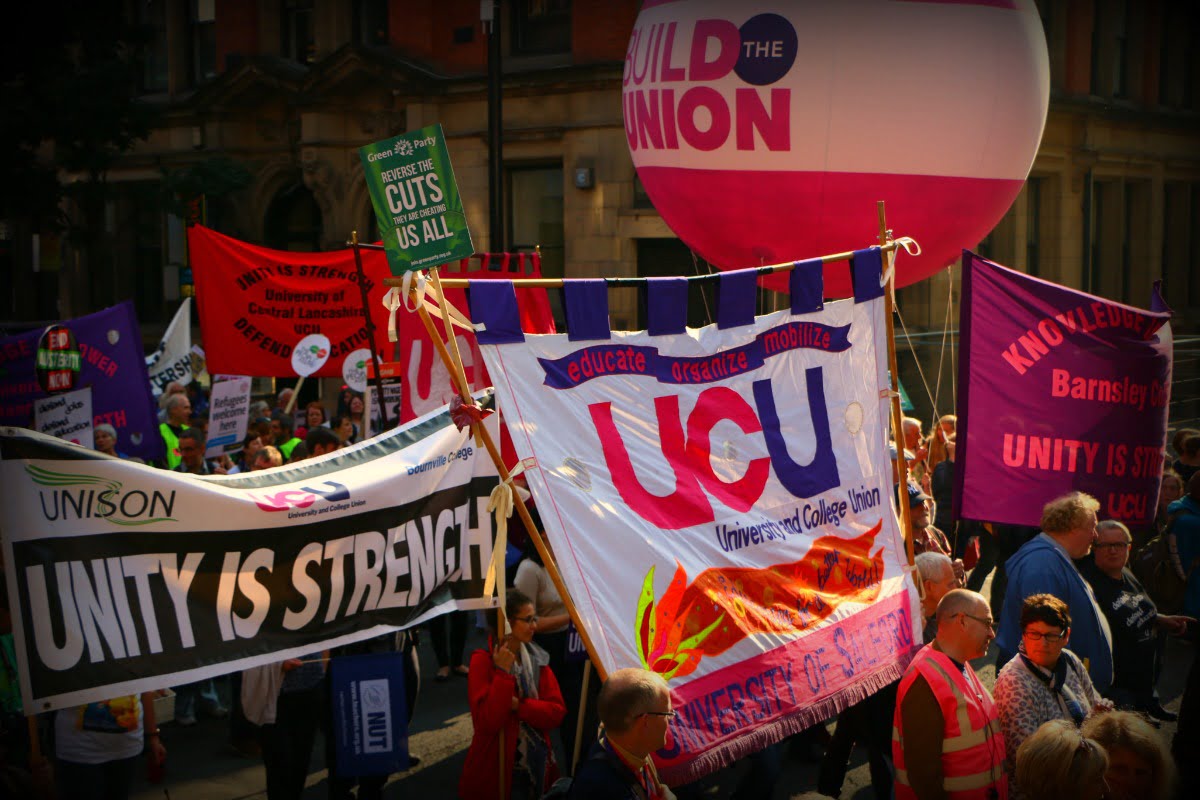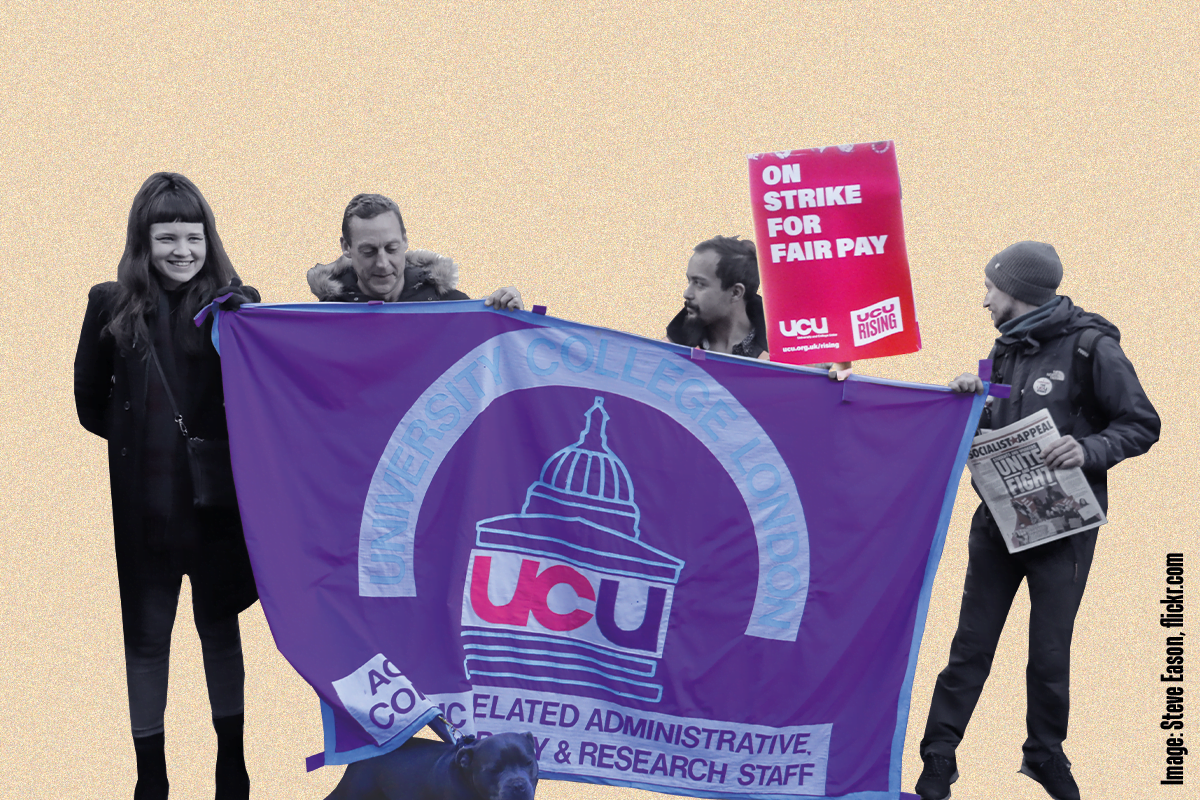This weekend’s UCU congress, taking place in Glasgow from 27-29 May, will be playing out against a backdrop of strikes and struggle in higher education (HE).
UCU branches on campuses across the country are currently waging a historic national marking and assessment boycott (MAB) over pay and conditions, which have been degraded by over a decade of ever-increasing marketisation.
This follows significant movement in negotiations around the HE pensions dispute – the result of determined strike action.
Afraid of this united movement, university bosses are lashing out, with a vindictive volley of pay deductions. At the same time, in the media, they are slandering lecturers’ action with a campaign of crocodile tears, decrying the damage being done to students’ education.
But UCU members are showing that they have the mettle and the will to fight on for the betterment of our sector, despite all the pressures and challenges that we have faced over the last year.
On the basis of bold leadership, with a coordinated and united national strategy, we could win both an inflation-busting pay rise and a genuine reversal of casualised working conditions.
Attacks
The employers are carrying out a nationally coordinated attack. This only underlines the urgency for launching one of our own.
Over 70 HE institutions, encouraged by the chief of the UCEA bosses’ union, are targeting members with pay deductions for participation in the MAB. At least 27 institutions are making threats of 100% deductions.
 This is effectively a lock-out, designed to play on the MAB’s weak point: the immense pressure put on individual members who refuse to mark. The bosses are placing their weight on these members, hoping to break them – and, in turn, smash our action.
This is effectively a lock-out, designed to play on the MAB’s weak point: the immense pressure put on individual members who refuse to mark. The bosses are placing their weight on these members, hoping to break them – and, in turn, smash our action.
The chief of UCEA, and their cheerleaders in the press, cloak these attacks in hollow rhetoric about defending the interests of students, who have to pay extortionate sums for their education.
This is entirely cynical. These very same bosses are the ones who have lobbied – and continue to lobby – for increased tuition fees.
On top of these threats, we have seen the escalation of local attacks. At the University of Brighton, 140 redundancies have just been announced to save £17m. At UEA, senior management is looking to cut courses and force compulsory redundancies, in order to save £45m.
There has been a public outcry over all these threats and attacks. Students have declared their support for staff on social media and at spontaneous rallies. And a joint cross-party letter against pay deductions has been signed by 50 MPs and peers.
This solidarity stands in sharp contrast to the hatred felt towards the bosses.
Profits
Nevertheless, what these campaigns currently focus on, to quote the aforementioned joint letter, is the idea there is “no ethical justification for making such punitive deductions”.
This moralising misses the point. Yes, breaking our union to force through wage deductions and redundancies certainly is terrible…terribly profitable!
The bosses are motivated first-and-foremost according to economic interests. Their goal is to keep education workers’ wages down to ensure the profitability of universities.
This gives UK HE institutions access to private loans, which in turn gives them access to investments in spin-offs and real estate – allowing them to build up brands, advertise courses as commodities, and compete on the market, nationally and internationally.
British university bosses are doing very well in this regard. Four out of the top ten universities in the QS World University Rankings are from the UK. UCU’s analysis of the 2021/22 financial year, meanwhile, found that HE institutions achieved an eye-watering income of £44.6bn and a total profit of £2.6bn.
Strategy
Amidst all of this, in interviews with the press and through union communications, UCU general secretary Jo Grady is speaking in militant terms.
This is to be welcomed. But the timing of her recent change of tone has left some members questioning how authentic it is. After all, this comes in the run-up to the UCU congress, where she is set to face votes of no confidence.
 This doubt is only reinforced by the lack of a unifying national strategy. The bosses are clearly terrified of the MAB. Their pay deduction attacks are a sign of weakness, not of strength. They should therefore be met with a decisive charge forward from our union.
This doubt is only reinforced by the lack of a unifying national strategy. The bosses are clearly terrified of the MAB. Their pay deduction attacks are a sign of weakness, not of strength. They should therefore be met with a decisive charge forward from our union.
Instead of providing a clear and bold campaign of nationally coordinated action, however, our leaders are limiting their demands to letter writing, social media posts, and a donation drive. This is all useful, but it should be supplementary, not offered as our primary strategy.
A fighting fund drive and media campaign are always helpful. But they do not address the core issue: of isolated individual members, and of branches being left alone to fight deductions.
Instead, we are told that strike action should be kept local and only used “where required”.
Leadership
This timid stance from our leaders comes as no surprise for most members. We know, in reality, that the MAB is being driven forward by rank-and-file members, who in turn are dragging behind them a leadership that was hoping that our action would be called off in favour of do-nothing discussions.
We should not forget: this is the same leadership that attempted to wind up the disputes earlier this year, by sending out misleading e-ballots that asked members to support an ‘offer’ that contained nothing but a real-terms pay cut and a promise for more talks on working conditions.
This situation must be addressed. There is simply too much at stake to put aside the question of transforming our union.
Members should challenge the current strategy being put forward by our leadership, and which is being championed by both UCU Commons and UCU Left. This year’s congress provides a vital opportunity for this.
Now more than ever, we need a fighting leadership that backs militant, coordinated strike action at a national level. We need a leadership that is not afraid of empowering rank-and-file members to take on the bosses, using every means at our disposal. This is how we can win.
Fightback
The recent victory at Queen Margaret University points the way forward. Here, the branch responded to the employers’ attacks with bold and militant strike action. This led to an immediate calling off of pay deductions.
Local students and fellow trade unionists rallied around this clear call to arms. We see in this branch’s response a strategy that combines multiple tactics – the most important of which is strike action.
 Indeed, at the Special Higher Education Conference in April, where the UCU rank and file finally got to have their say on the direction of our disputes, it was agreed that local strike action and rank-and-file strike committees should be set up to fight back against deductions.
Indeed, at the Special Higher Education Conference in April, where the UCU rank and file finally got to have their say on the direction of our disputes, it was agreed that local strike action and rank-and-file strike committees should be set up to fight back against deductions.
We have already seen a major win at Queen Margaret, where such action was taken. The question now is to coordinate this at a national level through strike committees, with members leading our dispute.
In this way, we could turn a defensive manoeuvre against deductions into an offensive struggle over pay and working conditions.
Struggle
Throughout the past five years of strike action, we have seen the continued determination of our members to fight back against marketisation.
Through ebbs and flows, our union’s members have shown consistently that they are prepared to fight for their livelihoods, and for the very future of the sector.
 We have seen the emergence of similar determination in the past year’s strike wave, as more and more sections of the working class enter into struggle.
We have seen the emergence of similar determination in the past year’s strike wave, as more and more sections of the working class enter into struggle.
It’s safe to say that we are at the beginning of what will be an extended process of intensifying class struggle.
What is needed is a unifying call for coordinated action from the trade unions leaders, and for a political struggle across the whole labour movement – not just against the Tories, but explicitly against capitalism itself: the system behind the ills we face.
If we don’t take a stand now, we will be reduced to merely managing the decline not just of the HE sector, but of our entire society.
UCU members should therefore join us in fighting for system change: to kick out capitalism, and to put workers and students in charge of running education – and the whole of society – on the basis of need, not profit.






